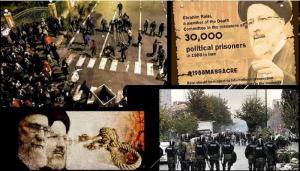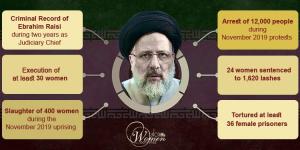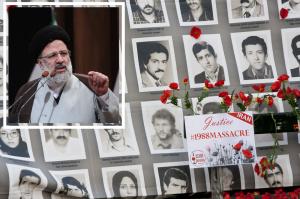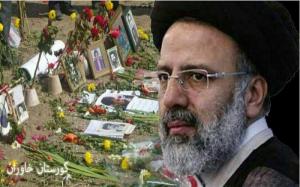(PMOI / MEK Iran) and (NCRI): In recent years, as more information about the 1988 massacre has emerged, Raisi and other former death commission members have publicly defended their roles, sometimes referring to the execution of MEK members as “God’s command.”
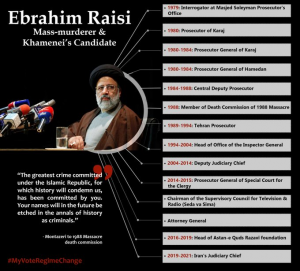
(PMOI / MEK Iran) and (NCRI): Ebrahim Raisi, a member of the 1988 Massacre’s “Death Commission” assigned as the highest judicial position within the regime.
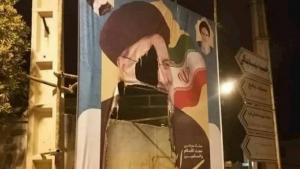
(PMOI / MEK Iran) and (NCRI): Iranian people are ripping posters of Ebrahim Raisi, the leading candidate for the regime’s sham presidential election.
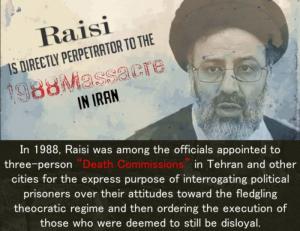
(PMOI / MEK Iran) and (NCRI): Ebrahim Raisi, a member of the 1988 Massacre’s “Death Commission” assigned as the highest judicial position within the regime.
The crimes in question certainly include the systematic torture that the judiciary meted out under Raisi’s leadership in the wake of the 2019 uprising.
— By Alejo Vidal-Quadras
PARIS, FRANCE, August 4, 2021 /EINPresswire.com/ — This week, Ebrahim Raisi officially becomes president of the regime in Iran. While virtually all of Iran’s high-ranking officials have had blood on their hands, Raisi’s orchestrated June 18 “election” was a particularly egregious example of such officials being rewarded for a history of human rights abuses. His inauguration represents an important test for the international communities, particularly Western democracies that pride themselves on shared humanitarian values.On June 19, Amnesty International released a statement condemning the Iranian regime’s move to promote Raisi to the presidency after he had served two years as judiciary chief and contributed to the further degradation of Iran’s already abysmal human rights record. “That Ebrahim Raisi has risen to the presidency instead of being investigated for the crimes against humanity of murder, enforced disappearance and torture, is a grim reminder that impunity reigns supreme in Iran,” said the organization’s Secretary-General, Agnès Calamard.
The crimes in question certainly include the systematic torture that the judiciary meted out under Raisi’s leadership in the wake of a nationwide uprising in November 2019. But those actions only compound to serve a legacy that he had established more than 30 years earlier when, as Tehran’s deputy public prosecutor, he played a leading role in the massacre of political prisoners during the summer of 1988.
Raisi was among the first individuals appointed to the “death commissions” that proliferated across the country in response to a fatwa from then-Supreme Leader Ruhollah Khomeini, which declared that all political prisoners affiliated to the Mojahedin-e-Khalq, MEK, were to be considered as “waging war on God,” and sentenced to death. The death commissions were tasked with interrogating political prisoners over their beliefs and affiliations, focusing especially on persons believed to be associated with the MEK.
In recent years, as more information about the 1988 massacre has emerged, Raisi and other former death commission members have publicly defended their roles, sometimes referring to the execution of MEK members as “God’s command.” Such shameless displays seem to have only reinforced decisions by the current Supreme Leader, Ali Khamenei, to reward those participants for their service to the suppression of dissent. Raisi’s rapid ascendance to the offices of judiciary chief and then president indicates that the pace of this reward has increased, no doubt in recognition of the danger the regime faces in the wake of the 2019 uprising.
Unfortunately, the international community has made such promotions possible by ignoring the “impunity” that was sharply criticized by Amnesty International in June and has been similarly criticized on many occasions by the MEK and other groups with a keen understanding of the regime’s crimes against humanity. Those groups have been calling out for years for Western powers and the United Nations to launch an official commission of inquiry into the 1988 massacre or to take any other action that demonstrates a genuine interest in accountability for participants in that massacre.
Ultimately, the international community must provide an affirmative answer to these requests. In the meantime, however, the very least it can do is avoid signaling that Tehran’s impunity remains intact and that the Supreme Leader is free to continue handing off the most influential positions in government and the private sector to death commission members or other advocates for violent attacks on political adversaries. It must be acknowledged that this is exactly the sort of signal the world would be sending if it welcomed Raisi, a well-known human rights abuser, at state visits or at the UN General Assembly.
It was announced that Enrique Mora, one of the European Union’s senior officials, will attend Raisi’s inauguration on August 4. In this regard, Josep Borrell, the EU’s chief diplomat, said: “It is crucial to engage diplomatically with the new administration and pass directly important messages.”
This stance on Raisi’s presidency and participation in Raisi’s inauguration, while many human rights organizations call for his accountability, is a disgrace for the EU.
On July 12, at the Free Iran World Summit, former US Congressman Robert Torricelli expressed disgust at the prospect of Raisi’s present at such an august venue. “If the United Nations decides that Raisi belongs to the United Nations,” he said, “then the United Nations does not belong in New York. We must not host terrorists, despots, and mass murderers.” It is a sentiment that applies equally well to the presence of the UN offices in Vienna and Geneva. The international governing body would be defamed throughout the world if it permitted Raisi to represent the people whose families he has killed by the thousands.
The same can be said of the European Union, its member states, and any other bodies that are in a position to formally receive Iran’s new president. If anyone does so, it should only be in order to arrest him on the principle of universal jurisdiction, as Sweden did in 2019 with former Iranian prison official Hamid Noury, another notorious participant in the 1988 massacre.
If no Western government has the courage to take such unilateral action against Raisi, then they must isolate him on the world stage and push for the long-overdue investigations that would inevitably lead to his prosecution at the International Criminal Court.
Alejo Vidal-Quadras, a professor of atomic and nuclear physics, was vice-president of the European Parliament from 1999 to 2014. He is President of the International Committee In Search of Justice (ISJ)
<
p class=”contact c9″ dir=”auto”>Shahin Gobadi
NCRI
+33 6 50 11 98 48
email us here
Visit us on social media:
Facebook
Twitter
Who is Ebrahim Raisi, a candidate in Iran presidential election and an executioner in 1988 massacre
![]()

